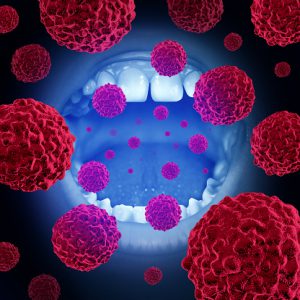Oral cancer, or mouth cancer refers to a group of cancers that can develop anywhere in the mouth, including the lips, tongue, cheeks, gums, tonsils, floor of the mouth, hard and soft palate, salivary glands, sinuses and throat.
Oral cancer usually appears as a growth or sore in the mouth that does not go away and it can be life threatening if not diagnosed and treated early. According to the Oral Cancer Foundation, over 51,000 people in the U.S. will be newly diagnosed with oral cancer in 2018.
The most common symptoms of oral cancer include:
- Swelling or thickening of the skin or lining of the mouth
- Development of lumps or bumps on the lips, gums, or other areas inside the mouth
- Sores that bleed or do not heal
- Unexplained bleeding in the mouth
- Numbness or loss of feeling of the face, mouth, or neck
- Difficulty chewing or swallowing
- Jaw pain or stiffness
- Hoarseness, chronic sore throat or change in voice
- A change in the way your teeth or dentures fit together
According to the American Cancer Society, men face twice the risk of developing oral cancer as women. Cigarette smokers are six times more likely than nonsmokers to develop oral cancers. Those who use chewing tobacco products are 50 times more likely to develop cancers of the cheek, gums, and lining of the lips. In addition, oral cancers are about six times more common in those who consume excessive amounts of alcohol. People who have a family history of cancer, have a weakened immune system or who have the human papillomavirus virus (HPV) are also at a greater risk of developing certain types of oral cancers.
To avoid developing oral cancer, it is recommended that you stop, or do not start using any form of tobacco, whether it is smoked or chewed, drink alcohol only in moderation, chose a healthy diet rich in vitamins and antioxidants, perform self-examinations of your month once a month, and see your dentist regularly.
As part of your routine dental exam, your dentist will conduct an oral cancer screening. This includes feeling for any lumps or irregular tissue changes in your neck, head, face, and oral cavity. When examining your mouth, your dentist will look for any sores or discolored tissue as well as check for any signs and symptoms mentioned above.
If diagnosed with oral cancer, treatment options include surgery to remove the cancerous growth, followed by radiation therapy and/or chemotherapy to destroy any remaining cancer cells.
Make an appointment with your dentist immediately if you have any persistent signs and symptoms of oral cancer. If you do not have a dentist, make an appointment at Jamaica Hospital’s Dental Center by calling 718-206-6980.
All content of this newsletter is intended for general information purposes only and is not intended or implied to be a substitute for professional medical advice, diagnosis or treatment. Please consult a medical professional before adopting any of the suggestions on this page. You must never disregard professional medical advice or delay seeking medical treatment based upon any content of this newsletter. PROMPTLY CONSULT YOUR PHYSICIAN OR CALL 911 IF YOU BELIEVE YOU HAVE A MEDICAL EMERGENCY.

